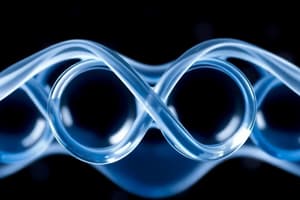Podcast
Questions and Answers
What can a solute be classified as?
What can a solute be classified as?
- Only a liquid
- Only a gas
- Only a solid
- Solid, liquid, or gas (correct)
According to the kinetic theory of gases, what primarily allows gaseous molecules to overcome attractive forces?
According to the kinetic theory of gases, what primarily allows gaseous molecules to overcome attractive forces?
- Strong intermolecular forces
- Low temperature conditions
- Thermal motion of molecules (correct)
- High density of gas
Which of the following statements correctly represents a property of liquids as a solute?
Which of the following statements correctly represents a property of liquids as a solute?
- Liquid solutes cannot dissolve in other liquids
- Liquid solutes mix uniformly with solvents (correct)
- Liquid solutes maintain their shape in a solution
- Liquid solutes generally have low energy particles
In the context of states of matter, what typically differentiates gases from solids and liquids?
In the context of states of matter, what typically differentiates gases from solids and liquids?
Which of these options is not a requirement for a substance to be classified as a solute?
Which of these options is not a requirement for a substance to be classified as a solute?
What best describes the state of matter where intermolecular forces are very strong and thermal motions have little influence?
What best describes the state of matter where intermolecular forces are very strong and thermal motions have little influence?
Which term describes a solute that can dissolve in more than 10,000 parts of solvent?
Which term describes a solute that can dissolve in more than 10,000 parts of solvent?
What is the correct unit for expressing the concentration of solute in grams per 100 ml of solvent?
What is the correct unit for expressing the concentration of solute in grams per 100 ml of solvent?
In the context of solubility, which category is used for substances that can dissolve in 30 to 100 parts of solvent?
In the context of solubility, which category is used for substances that can dissolve in 30 to 100 parts of solvent?
In the Kelvin scale, which state of matter has the highest thermal motion?
In the Kelvin scale, which state of matter has the highest thermal motion?
Flashcards are hidden until you start studying
Study Notes
Solutes and States of Matter
- Solutes can exist in three forms: solid, liquid, or gas.
Kinetic Theory of Matter
- Describes the behavior of molecules in different states of matter.
Gaseous State
- Molecules exhibit rapid thermal motion, overcoming intermolecular attractive forces.
- Gases do not have a definite shape or volume and expand to fill their container.
Liquid State
- Molecules are held together by Van der Waals forces, providing some coherence.
- Liquids occupy a definite volume but can change shape based on the container.
Solid State
- Strong intermolecular forces create a high degree of order among molecules.
- Thermal motion has minimal effect on the structure of solids.
Solubility Classifications
- Very Soluble: Less than 1 part solute per solvent.
- Freely Soluble: 1 to 10 parts solute per solvent.
- Soluble: 30 to 100 parts solute per solvent.
- Sparingly Soluble: 100 to 1000 parts solute per solvent.
- Slightly Soluble: 1000 to 10,000 parts solute per solvent.
- Practically Insoluble: More than 10,000 parts solute per solvent.
Solubility Measurement Units
- Percentage (w/w): Grams of solute per 100 grams of solvent.
- Volume/Volume (w/v): Milliliters of solute per 100 milliliters of solvent.
- Weight/Volume (w/v): Grams of solute per 100 milliliters of solvent.
Random Molecular Movement
- Molecules exhibit completely random movement within contained spaces, contributing to states of matter dynamics.
Studying That Suits You
Use AI to generate personalized quizzes and flashcards to suit your learning preferences.




